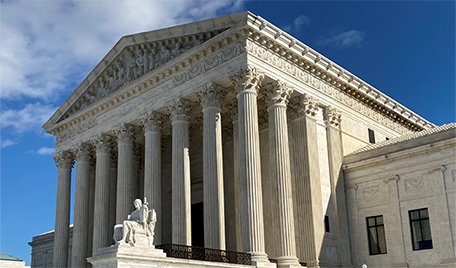The next round of oral arguments at the Supreme Court starts on November 27, 2023, and there’s plenty on the docket. The arguments include a significant case involving the Purdue Pharma bankruptcy settlement, issues involving the sentencing of felons in possession of firearms, and a tax case addressing the meaning of the 16th Amendment.
 Here are the key questions in front of the Court in these seven arguments:
Here are the key questions in front of the Court in these seven arguments:
Monday, Nov. 27, 2023
Brown v. United States (22-6389) and Jackson v. United States (22-6640)
The Armed Career Criminal Act imposes a maximum 10-year sentence on felons who possess a firearm but a 15-year minimum sentence on felons who have a firearm violation and three “serious drug offense” convictions. Brown claims his prior drug convictions should not count toward a longer sentence due to a conflict between current state and federal drug possession laws.
Tuesday, Nov. 28, 2023
McElrath v. Georgia (22-721)
The Georgia Supreme Court held that a jury’s verdict of acquittal on one criminal charge and its verdict of guilty on a different criminal charge arising from the same facts were impossible to reconcile. It vacated both verdicts and held that the defendant could be prosecuted a second time on both charges. The question is whether the Fifth Amendment’s Double Jeopardy Clause prohibits a second prosecution for a crime of which a defendant was previously acquitted.
Wilkinson v. Garland (22-666)
The question in this case is whether courts of jurisdiction can review the U.S. attorney general’s decision to cancel the removal of non-permanent residents under the Immigration and Nationality Act. The attorney general can cite four eligibility criteria, including “that [the] removal would result in exceptional and extremely unusual hardship” to the applicant’s immediate family member who is a U.S. citizen or a lawful permanent resident.
Wednesday, Nov. 29, 2023
SEC v. Jarkesy (22-859)
In this case, the Court is considering questions related to statutory provisions involving the Securities and Exchange Commission and its ability to seek civil penalties under the Seventh Amendment; the enforcement of securities laws through agency adjudications; and a question about for-cause removal protection for administrative law judges.
Monday, Dec. 4, 2023
Harrington v. Purdue Pharma L.P. (23-124)
The Supreme Court will consider a Justice Department request to block the bankruptcy settlement involving opioid manufacturer Purdue Pharma and its former owners, the Sackler family. The settlement involves a $6 billion payment from the family, with the condition that third-party releases would prevent further victim lawsuits against the Sacklers.
Tuesday, Dec. 5, 2023
Moore v. United States (22-800)
This case addresses the meaning of the 16th Amendment, which granted Congress the power to pass an income tax. The Ninth Circuit held that a married couple could be taxed on earnings that were not realized income but were retained and reinvested by a corporation in which they are minority shareholders. The Justices will decide whether the 16th Amendment authorizes Congress to tax unrealized sums without apportionment among the states.
Wednesday, Dec. 6, 2023
Muldrow v. St. Louis (22-193)
The question before the Court involves the meaning of Title VII of the Civil Rights Act of 1964, and whether the act makes it unlawful for an employer to discriminate in transfer decisions absent a separate court determination that the transfer decision had caused a significant disadvantage.
Scott Bomboy is the editor in chief of the National Constitution Center.







